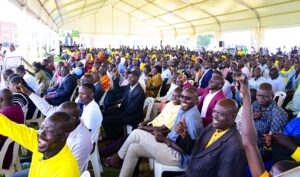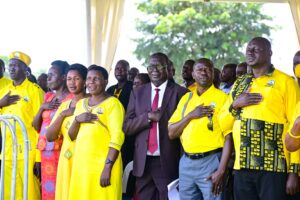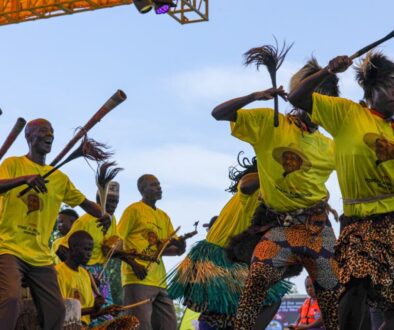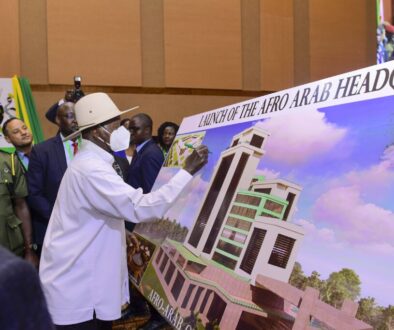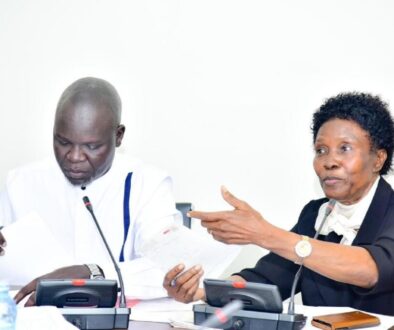No compensation for Teso war victims – Museveni
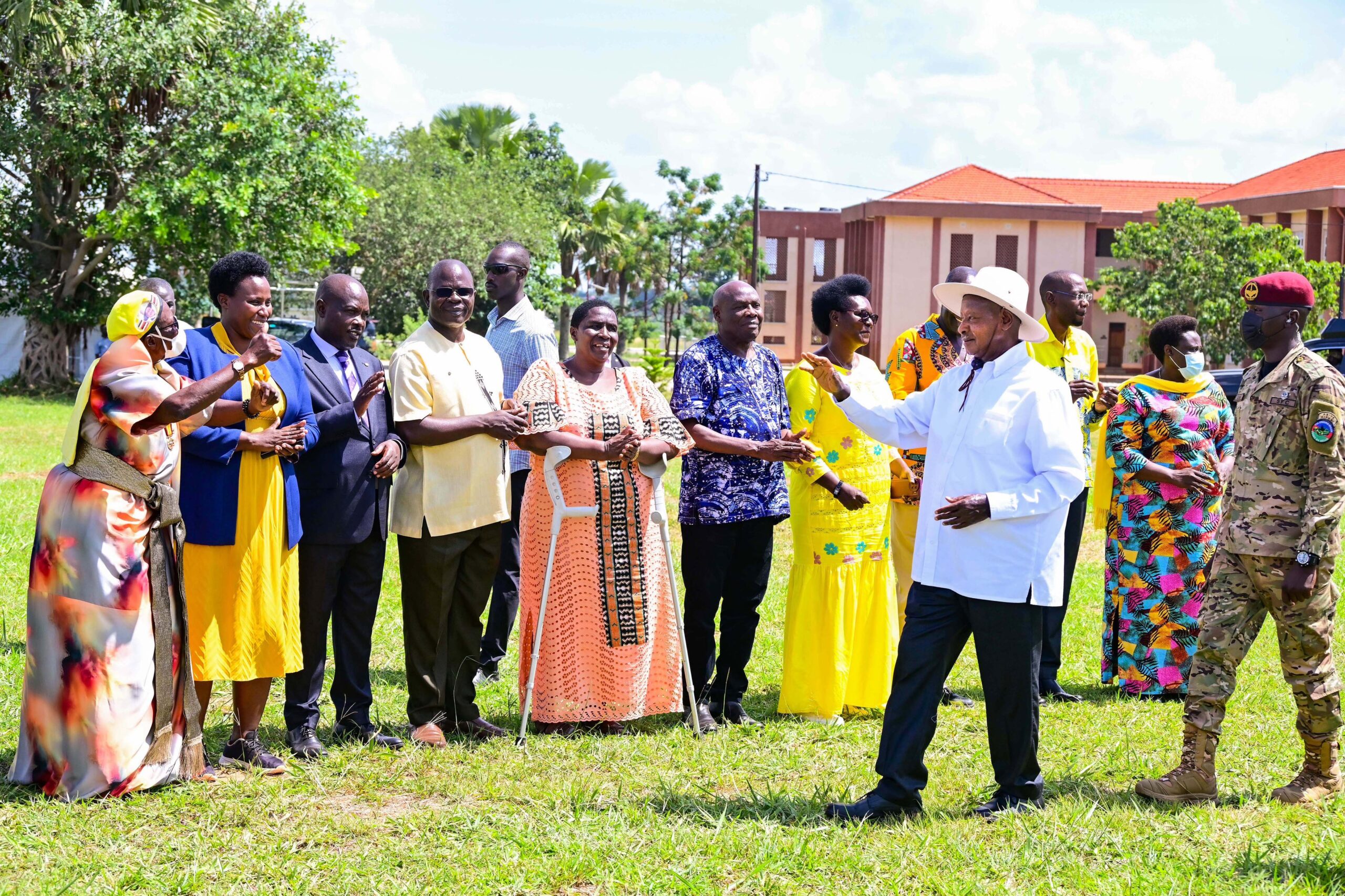
CAPTION: President Yoweri Museveni waves to Teso leaders on arrival at Soroti University Friday, 15th, 2025. (PPU photo).
By Stephen Wandera Ouma
SOROTI – President Yoweri Museveni addressed the people of Teso with a firm message that the government cannot provide direct compensation for losses incurred during the war. Still, it can focus on restocking and rehabilitation for each affected family. His remarks came during a meeting with Teso leaders in Soroti City, where the topic of cattle compensation was at the forefront.
During the interactive session, Bosco Okiror, the Member of Parliament for Usuk County in Katakwi District and Chairperson of the Teso Parliamentary Group (TPG), raised concerns about the lack of transparency in the ongoing cattle compensation process. He explained that while the government is currently focusing on cattle, there are broader issues at play. “There are cases in court regarding war claimants who have suffered torture, displacement, and loss of cattle since 1962,” Okiror pointed out.
He criticized the Attorney General’s office for concentrating solely on Teso Animals and Property Compensation Organization (TAPCO), highlighting that many groups, particularly the Teso War Claimants, have not yet received compensation. Okiror urged President Museveni to intervene and facilitate negotiations outside the court system, emphasizing that no law prevents discussions aimed at resolving such matters amicably.
Stephen Ilemukorit, the Resident District Commissioner (RDC) for Katakwi District, shared his observations on how cattle compensation has become a political issue, especially during election seasons. He noted that opposition parties often exploit the frustrations of the people by making promises about compensation, further aggravating the situation. “Every political season, opposition politicians use this delayed cattle compensation to attack the National Resistance Movement (NRM), which has left the people feeling more frustrated,” he said.
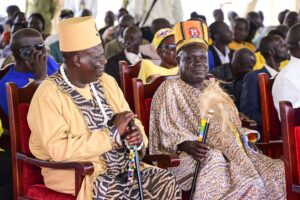
CAPTION: Teso Cultural leaders listen to President Museveni at Soroti University Friday, 15th, 2025. (PPU photo).
Teddy Acam, an NRM party mobilizer in Teso, echoed similar sentiments regarding the lack of transparency in the compensation process. She revealed that allegations of corruption have surfaced, with some individuals being misled about the amounts they are entitled to receive. “For instance, if you are supposed to receive ten million shillings, you might only end up getting nine million because someone else takes a cut,” Acam explained.
She urged the president to find a solution to the ongoing issues surrounding cattle compensation to avoid further unrest in Teso. Acam also highlighted a critical issue: many claimants have died without ever receiving compensation. Families attempting to access funds on behalf of deceased relatives face bureaucratic hurdles, further complicating the process of obtaining compensation.
Jackson Kafuuzi, the Deputy Attorney General and Minister of State for Justice and Constitutional Affairs, provided an overview of the situation. He noted that in 2003, claimants in the regions of Teso, Lango, and Acholi filed lawsuits against the government. Since the compensation program was launched in 2021, 200 billion shillings have been allocated, benefiting around 28,000 war claimants.
However, Kafuuzi acknowledged that the program halted in 2022 and 2023 due to a lack of funds but resumed in 2024. Despite the funds allocated, Kafuuzi mentioned challenges such as money bouncing back from some claimants’ accounts, often due to the passing of the account holders. He also noted that some minors had mistakenly been added to the list of beneficiaries, leading to further complications.
Vice President Jessica Alupo emphasized the political ramifications of the cattle compensation issue, stating that it has become a prevalent topic in campaign discussions. “The people of Teso are eager to discuss and resolve the issues surrounding cattle compensation,” she remarked. Alupo recognized the dual role of Teso’s inhabitants as both cattle keepers and cultivators, underscoring the significance of the compensation program.
In response to the ongoing discussions, Museveni stated, “These wars were caused by bad politics.” He explained that compensation was sought due to significant losses, which stem from a history of political strife. He questioned the feasibility of compensating for war on an international scale, prompting Kafuuzi to clarify that such compensation is not recognized globally.
CAPTION: Teso leaders listen to President Museveni at Soroti University Friday, 15th, 2025. (PPU photo).
Museveni reiterated, “We cannot compensate for war; it’s a natural occurrence, like an earthquake.” He stressed that while the government cannot provide compensation for war losses, it can offer rehabilitation and restocking for families in Teso. Museveni proposed a flat rate approach to compensation, suggesting that if the allocated 169 billion shillings were distributed evenly, each family could receive approximately seven million shillings. He called for the formation of a committee comprising community leaders, elders, youth, and women to discuss the best way forward.
“I want to give one month to the Vice President and the Ministry of Teso Affairs to consult with the community and report back to me before we initiate a program that benefits all households,” Museveni announced. He concluded by reiterating that while restocking and rehabilitation are possible, direct compensation for war is not feasible, as such events are natural occurrences.
The issue of cattle compensation in Teso has gained renewed attention, particularly as opposition leaders from the Forum for Democratic Change (FDC) and National Unity Platform (NUP) launched campaigns centered around the slogan “No cow, no vote.” This has, in many respects, pressured the ruling party to address the grievances of those who have yet to receive any benefits from the compensation program. The people of Teso continue to call for accountability, asserting that the government must take responsibility for failing to secure their lives and property during the insurgency.
CAPTION: Teso leaders listen to President Museveni at Soroti University Friday, 15th, 2025. (PPU photo).
